The refresher training for firefighters of Montenegro was hosted and organized by the National Protection and Rescue Directorate of the Republic of Croatia and co-organized by the Disaster Preparedness and Prevention Initiative for South Eastern Europe (DPPI SEE) from 21 to 26 October 2012 in the Firefighting Operations Centre Divulje near Split as the second of two refresher trainings with respect to wildfires management (the first refresher training was organized for firefighters of Bosnia and Herzegovina in May 2012).
Disaster Management Training Programme
-
The training was organised by the Bulgarian Federation of Speleology and Bulgarian Cave Rescue Unit, Chief Directorate Fire Safety and Civil Protection of the Ministry of Interior of Republic of Bulgaria and supported by the Administration of the Republic of Slovenia for Civil Protection and Disaster Relief (ACPDR), Ministry of Defence of the Republic of Slovenia. The training represented Bulgarian contribution to the DPPI SEE Disaster Management Training Programme 2011
Training objectives
During the 8-day training there were 80 hours of various lessons, which took form of lectures, short demonstrations, practical work in smaller caves for consolidation of knowledge and bigger final exercise of the cave rescue activities.
Training was based on various practical exercises and theoretical knowledge, necessary for successful rescue activity and even for the prevention of accidents in the caves.
Extract from contents
Cave conservation
Single rope technique – Alpine style
Procedures for accident in the cave
Examination of the victim
Setting up of evacuation and transport systems and learning rescue manoeuvres
Preparation and evacuation of a victim/stretcher
Planning cave rescue and importance of exercise/rescue analysis
Setting up rescue units for international intervention
Presentation of various specialities inside the rescue services
Target audience
The programme was primarily aimed at volunteer speleologists of caving clubs, firefighters, police officers, soldiers, health workers and other interested protection, rescue and relief forces whose members had passed the speleologist’s examination or had completed equivalent national programmes for independent caving activity and had sufficient experience in the field with excellent knowledge of rope technique (SRT). All participants had to demonstrate in practice on the first day of training that they had the required level of knowledge.
Methodology
The training was implemented as a combined structure of theoretical lectures and practical work given and supervised by the licensed teachers and instructors from the Training Centre for Civil Protection and Disaster Relief of the Republic of Slovenia of ACPDR. The training programme ‘’Cave Rescuer’’ is approved and signed by the Minister of Defence of the Republic of Slovenia.
-
The training was conducted at the Training Centre for Civil Protection and Disaster Relief in Ig near Ljubljana (Slovenia) and it was hosted by the Administration of the Republic of Slovenia for Civil Protection and Disaster Relief and supported by the Swedish Civil Contingencies Agency.
The training represented Slovenian contribution to the DPPI SEE Disaster Management Training Programme 2011. Training objectives At the training the participants gained theoretical knowledge and basic practical skills in the field of fire extinguishing, known as hot fire/flashover training. The training therefore improved the participants’ knowledge of basic skills and techniques of fire-fighting and basic operational procedures for indoor fires. Generally the training also intends to raise awareness on procedures and practices of fire development and behaviour in different scenarios. Target audience The training was intended for professional operational fire-fighters and commanders from the DPPI SEE countries (1-2 per country).
It was attended by representatives of Albania, Bosnia and Herzegovina, Bulgaria, Croatia, Macedonia, Montenegro, Serbia, Romania and Turkey Methodology The training was implemented as a combined structure of theoretical lectures and practical work given and supervised by the licensed teachers and instructors who were trained by the Swedish Rescue Services Agency. The training ‘’Hot Fire Training - module A’’ is proved and signed by the Minister of Defence of the Republic of Slovenia.
-
The course was organised within the DPPI SEE/ Capacity for Disaster Reduction Initiative (CADRI)/ Swedish Civil Contingencies Agency (MSB) DRR project (Phase II) and hosted by Croatian National Protection and Rescue Directorate. The course at the same time represented Croatian contribution to the DPPI SEE Disaster Management Training Programme 2011. The aim of the course was to strike a balance between presentation skills and other aspects of training course management, from the preparation of material to running exercises; and from training needs analysis to evaluation of training, including review of training events. The event was part of capacity development project supported by CADRI and MSB aimed at supporting the development of disaster risk reduction capacity at all levels
- governments and organizations
- in the South Eastern Europe region in order to improve their ability to better understand and manage the variety of disasters faced by the region.
The training course was attended by representatives of national emergency management authorities and Red Cross Societies of Bulgaria, Croatia, Macedonia, Romania, Serbia, Slovenia and Turkey.
-
The workshop which represents Turkish contribution to the DPPI SEE DMTP for the year 2013 was hosted by Disaster and Emergency Management Presidency of Turkey (AFAD). Fourteen (14) participants from DPPI SEE member countries (Albania, Bosnia and Herzegovina, Bulgaria, Macedonia, Romania and Serbia) and 65 participants from AFAD, Ministry of Labor and Social Security, Ministry of Environmental and Urban Planning, universities and non-governmental organizations from Turkey took part in the workshop.
The following topics were discussed at the workshop through a set of group studies:
- Legal and regulatory framework
- Economic and financial issues
- Institutional framework
- Climate change
- ICT information & communication technology
- Transport
- Chemical materials
- Measures on mining waste
Marine pollution from accidentsOn Day I of the workshop the participants were given an opportunity to visit AFAD’s 112 Emergency Call Center and MOBESE City Information and Security System. Detailed account the workshop can be found in Future Policies and Strategy for Man-Made Disaster Management-AFAD REPORT
-
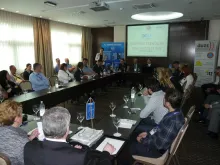
The conference was organized by the University of Applied Sciences Velika Gorica and supported by National Protection and Rescue Directorate (NPRD) of the Republic of  Croatia. The event presents one of the Croatian contributions to the DPPI SEE Disaster Management Training Programme for 2013. The focus of the 6th International Scientific and Professional Conference was on "Contemporary Policies of Crisis Management" (Day I), while the discussions of the Roundtable on Day II addressed the subject of “Modern Trends in Civil Protection” and involved active participation of all DPPI SEE representatives.
Croatia. The event presents one of the Croatian contributions to the DPPI SEE Disaster Management Training Programme for 2013. The focus of the 6th International Scientific and Professional Conference was on "Contemporary Policies of Crisis Management" (Day I), while the discussions of the Roundtable on Day II addressed the subject of “Modern Trends in Civil Protection” and involved active participation of all DPPI SEE representatives.
The aim of the Crisis Management Days was not only to provide the opportunity for an exchange of knowledge and experiences in the area of crisis management but also to serve as an opportunity for further widening of networks among experts, academicians and other responsible actors in the field of crisis management. The conference opening ceremony included the keynote address by the President of the Republic of Croatia, Prof. Ivo JOSIPOVIC, Ph.D, and was supplemented by speeches from Mr. Jadran PERINIC, Ph.D (Director General of NPDR), Mrs. Paola ALBRITO (Head of UNISDR Europe Region Office), Mr. Ivan Toth, Ph.D (Dean of the University of Applied Sciences Velika Gorica), David FABI (Italian Civil Protection Department) and Head of Secretariat.
Some of the main subtopics of the Conference included: 1) Environmental Protection and Post-Crisis Recovery, 2) Public-Private Partnership in Response to Crisis, 3) Crisis Management and Communication Strategies, 4) Business Sector - Business Challenges and Risks, etc. (CONFERENCE PROGRAMME)
The main goal of the Round Table was to discuss all elements of modern civil protection systems, as well as to discuss and evaluate the significance of each of these elements in order to be able to make a joint assessment of their role in functioning of the whole system and of those elements relevant for the SEE. The aim was also to contribute to defining civil protection in the region as well as to enable other stakeholders to gain better understanding of modern developments in civil protection, especially within the frame of the EU. Topics for discussion included: 1) Mechanisms for Disaster Risk Reduction, 2) Critical infrastructure protection as an instrument for action and priority sectors/objects, 3) Voluntary involvement of knowledge and capabilities of the society (science, NGO’s and volunteers) in disaster risk reduction and response capacities, 4) International cooperation for strengthening of the civil protection systems, insuring exchange of experiences and principle of solidarity and subsidiarity and 5) Way forward for SEE nations and DPPI SEE
Moderator of the roundtable was Mr. Damir Čemerin (recently deceased colleague), Deputy Civil Protection Commander, National Protection and Rescue Directorate Participants from 8 DPPI SEE Parties took active participation in the Round Table discussions with other international and national experts.
-
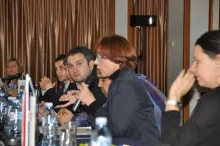
 The seminar was hosted by the Sector for Emergency Management of the Serbian Ministry of Interior within the DPPI SEE Disaster Management Training Programme for the year 2016.
The seminar was hosted by the Sector for Emergency Management of the Serbian Ministry of Interior within the DPPI SEE Disaster Management Training Programme for the year 2016.
The seminar aimed to bring together civil protection professionals responsible for development of national risk assessment in their respective country and professionals involved in risk assessment at the local level. It provided an opportunity for exchange of experiences with/ among the DPPI SEE member countries on adoption of their national risk assessments and the methodology for risk assessment development, as well as for discussion on similarities and differences in legal obligations and responsibilities related to the risk assessment development. At the same time, one of the objectives was to trigger exchanges of professional views and opinions regarding the risks identified at the national level.
 Thirty-three (33) persons attended the seminar, including eleven (11) participants - representatives of the DPPI SEE member countries (Albania, BiH, Bulgaria, Macedonia, Montenegro, Serbia and Slovenia) and guest speakers from Swedish Civil Contingencies Agency (MSB), Serbian Protection and Nuclear Safety Agency, National Water Management Directorate, Public Water Management Company “Serbia Waters”, Republic Geodetic Authority, Petroleum Industry of Serbia „NIS“.
Thirty-three (33) persons attended the seminar, including eleven (11) participants - representatives of the DPPI SEE member countries (Albania, BiH, Bulgaria, Macedonia, Montenegro, Serbia and Slovenia) and guest speakers from Swedish Civil Contingencies Agency (MSB), Serbian Protection and Nuclear Safety Agency, National Water Management Directorate, Public Water Management Company “Serbia Waters”, Republic Geodetic Authority, Petroleum Industry of Serbia „NIS“.
The seminar was organized in a plenary session with twenty-minute presentations delivered by all the participating countries and guest speakers.
-
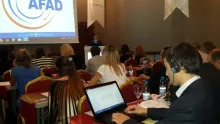
The aim of the workshop hosted by AFAD’s Legal Consultancy Department was to encourage competent  legal experts of the DPPI SEE member countries to exchange information with regard to their national disaster management frameworks and brainstorm constructive recommendations through assessment of the following:
legal experts of the DPPI SEE member countries to exchange information with regard to their national disaster management frameworks and brainstorm constructive recommendations through assessment of the following:
- Strengths and weaknesses of the existing legal frameworks
- Legal analysis (if any) of regulations governing the areas such as early warning, environmental management, risk insurance, humanitarian aid, human rights, women and vulnerable groups in disasters
- Need for amendments and/or adjustments in the disaster management legislations to comply with technological and/or social developments, including in line with other national and international requirements.
 Workshop discussions mainly built upon crucial elements of the countries’ presentations, including upon the key problems and gaps identified, e.g.: national strategic challenges in shifting the national focus from recovery and relief to prevention and preparedness and their reflection in the countries’ legal systems, the governments’ legal responsibilities throughout the disaster management cycle, national disaster management funding constraints under the existing legislations, etc.
Workshop discussions mainly built upon crucial elements of the countries’ presentations, including upon the key problems and gaps identified, e.g.: national strategic challenges in shifting the national focus from recovery and relief to prevention and preparedness and their reflection in the countries’ legal systems, the governments’ legal responsibilities throughout the disaster management cycle, national disaster management funding constraints under the existing legislations, etc.
Due to the on-going migrant/ refugee crisis, the workshop had a rather low attendance. Ten (10) participants from five (5) DPPI SEE member countries (Albania, Bulgaria, Macedonia, Montenegro and Serbia), next to other ten (10) representatives of AFAD, attended the event. This being the case, AFAD, inter alia, also put forth legal recommendations of Turkey for such crisis management.
-
Final Workshop on Disaster Inventory Management System: DesInventar, 6-7 March 2014, Tirana, Albania
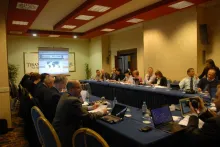
The final workshop on “Disaster Inventory Management System: DesInventar” and the presentation of the historical data collection on disaster loss in Albania was organised within the DPPI SEE Disaster Management Training Programme for the year 2014 and represents Albanian contribution to the Programme. The Workshop was hosted by the General Directorate of Civil Emergencies - Ministry of Internal Affairs of Albania and was jointly organized by the DPPI SEE, UNISDR and CIMA Research Foundation.
The main objectives of the workshop was to introduce the DesInventar as a web platform tool for building disaster database with its methodology for disasters loss accounting and to present the Albanian historical inventory on disaster losses.
Some of the topics covered within the workshop programme were: Disaster Theory (Hyogo Framework for Action, Risk Assessment, National Disaster Database and Inventory), the Global Assessment Report GAR 2013, Introduction to DesInventar (Data cards, data collection methodology, concepts and definitions, event definition, type of disaster, effects), Data Entry process, How to get DesInventar for your country, etc.
-
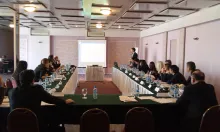
The idea behind the workshop which represents the Macedonian contribution to the DPPI SEE Disaster Management Programme for the year 2014  was to get together experienced first responders and policy developers from the region in order to brain storm ideas about the most optimal model for disaster information management system. The workshop was hosted by the Protection and Rescue Directorate of the Republic of Macedonia.
was to get together experienced first responders and policy developers from the region in order to brain storm ideas about the most optimal model for disaster information management system. The workshop was hosted by the Protection and Rescue Directorate of the Republic of Macedonia.
The workshop itself had two goals:
1) National - further development of the various national information systems of the DPPI SEE member states. Each participating state was given an opportunity to voice their demand for improvement of the existing national information system based on their experiences.
2) Regional - in support of the idea behind the creation of the DPPI SEE: “Strengthening and enhancing bilateral and multilateral cooperation, facilitating exchange of information in the field of disaster preparedness and prevention at all levels among competent national disaster management authorities.”
Experienced professionals with specific knowledge of disaster management and representatives of private sector engaged in disaster management related businesses gave presentations and lectures on the workshop topics. For details regarding the design, programme, lectures and participants at the workshop please refer to the Report on the event.
-
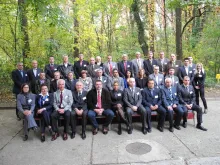
This seminar was Serbian contribution to the Disaster Management Training Programme for 2013 within the activities of Disaster Preparedness and Prevention Initiative for South Eastern Europe (DPPI SEE) and was organized by the Sector for Emergency Management of the Ministry of Interior of the Republic of Serbia.
Seminar was attended by representatives from 9 countries of the region – Albania, Bosnia and Herzegovina, Bulgaria, Croatia, Macedonia, Montenegro, Slovenia, Romania and Turkey, as well as representatives of the Red Cross Serbia.
The main goal of the seminar was presenting the place and role of Civil Protection (CP) Units in the Protection and Rescue System of Republic of Serbia and countries in the region. This was accomplished through sharing experience and lessons learned on drafting and implementing the legal regulations in this filed and through discussions on methods of their forming on the national and local level and their training. During seminar each participating country shared its experience in creating CP units and their use in protection and rescue system of their country.
Within the seminar a consequence management field exercise “ADA 2013” was organized. The main objective was to show operational capabilities of civil protection units of the Republic of Serbia specialized for protection and rescue from the ruins and floods, as well as the capabilities of CP units specialized for evacuation and shelter provision and practice their cooperation with other emergency services and the Red Cross and therefore improve national ability to effectively respond to emergency situation.
-
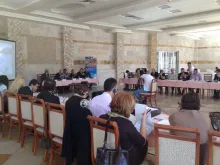
The workshop, held from 2-3 October in Budva, Montenegro, was hosted by the Directorate of Emergency Situations of the Government of Montenegro within the framework of the DPPI SEE and was organized in cooperation with DPPI SEE Secretariat, UNICEF Regional Office for Central and Eastern Europe and Commonwealth of Independent States (CEE/CIS) and UNISDR Office for Europe. The workshop presents Montenegrin contribution to the DPPI SEE Disaster Management Training Programme 2013.Government representatives from ten countries of the South Eastern Europe (SEE) region participated in the workshop, notably Bosnia and Herzegovina, Bulgaria, Macedonia (former Yugoslav Republic of), Moldova, Montenegro, Romania, Serbia, Slovenia and Turkey. Unfortunately, Croatia could not be represented at the meeting. The country delegations included a mix of participants, including civil protection agencies, education sectors, school directors and local governments. In addition, there were representatives from DPPI Secretariat, UNICEF Regional Office and UNICEF Country Offices (BiH, Moldova and Montenegro), UNISDR Europe and UNDP Montenegro. The workshop was facilitated by a DRR expert from Switzerland, who until 2012 was a member of the Swiss National Platform for Disaster Risk Reduction (PLANAT).
As the title of the workshop suggests, the main purpose of the workshop was to provide a forum to relevant government representatives in the SEE region to share knowledge, exchange experience and discuss good practices in disaster risk reduction, with a particular focus on HFA Priority 3. By doing so, the workshop contributed to the advancement of the goals set under the Priority # 3 i.e. use knowledge, innovation and education to build a culture of safety and resilience at all levels. The workshop also provided a unique opportunity to establish or further strengthen communication and networking between the governments and organizations supporting their efforts in risk reduction.
-
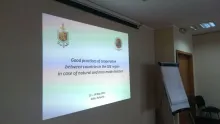
The seminar represents the Bulgarian contribution to the DPPI SEE Disaster Management Training  Programme for the year 2014 and was hosted by the Chief Directorate Fire Safety and Civil Protection of the Ministry of Interior of the Republic of Bulgaria.
Programme for the year 2014 and was hosted by the Chief Directorate Fire Safety and Civil Protection of the Ministry of Interior of the Republic of Bulgaria.
The aim of the event was to facilitate the exchange of information and best practices of cooperation in the field of fire safety and civil protection between countries in the SEE region. The seminar provided the participants with the opportunity to establish connections for a better and more efficient operational response to natural and man-made disasters in the SEE region.
Representatives of seven (7) DPPI SEE member states, namely Albania, Bulgaria, Croatia, Macedonia, Montenegro, Serbia and Turkey, participated in the seminar, in addition to competent representatives of the Bulgarian Red Cross.
In the course of the two-day seminar, the participants also had an opportunity to visit the National Operations Center situated at the premises of the Ministry of Interior where they were presented with information on the main activities of the Center (more detailed information on the seminar programme and observations by the host can be found in the “Report on the event”
-
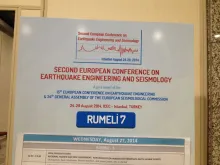
The Second European Conference on Earthquake Engineering and Seismology (2ECEES) was organized in Istanbul, Turkey, 25-29 August, 2014 as a joint event of European Association of Earthquake Engineering (EAEE) and European Seismological Commission (ESC). With support from Turkish Prime Ministry Disaster and Emergency Managment Agency (AFAD), the conference has also been included in the DPPI SEE Disaster Management Training Programme for the year 2014.
The purpose of the conference was to provide a platform for introducing and discussing Earthquake Engineering and Seismology along with priority issues of global importance. The conference was primarily aimed at civil engineers, geological and geophysics engineers.More than 1,200 people attended the conference. On the margines of the conference programme, a side meeting was organised by AFAD for representatives of 9 DPPI SEE member countries for purpose of strenghtening the collaboration related to seismic networks and relevant data sharing.
The following is the list of topics of the Second European Conference on Earthquake Engineering and Seismology (2ECEES):
- Seismicity of the European-Mediterranean Area
- Earthquake Source Physics
- Earthquake Forecasting and Prediction
- Engineering Seismology and Seismic Hazard Assessment
- Acquisition and Analysis of Strong Motion Data
- Microzonation and Site Effects
- Geotechnical Earthquake Engineering
- Earthquake Scenarios, Vulnerability and Loss Assessment Studies
- Seismic Design Code Developments and Related Issues
- Performance-Based Seismic Assessment and Design
- Seismic Analysis and/or Testing of Structural Elements and/or Systems
- Seismic Analysis and Design of Tall Buildings
- Seismic Analysis and Design of Bridges
- Seismic Analysis and Design of Underground Structures
- Seismic Analysis and Design of Marine Structures
- Seismic Analysis and Design of Foundation Systems / Soil-Structure Interaction
- Seismic Analysis and Design of Transportation and Lifeline Systems
- Seismic Analysis and Design of Active and Passive Structural Control Systems
- Seismic Performance of Historical Monuments and Structures
- Earthquake Risk Mitigation Policies and Methodologies
- Lessons from Recent Earthquakes
-
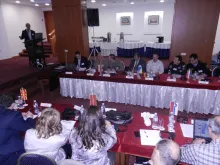
The seminar was hosted by the Sector for Emergency Management of the Ministry of Interior of the Republic of Serbia within the Disaster Management Training Programme of the Disaster Preparedness and Prevention Initiative for South East Europe (DPPI SEE) as a Serbian contribution to the Programme for the year 2014.
The aim of the seminar was to share experiences and good practices, as well as to develop discussion during the seminar on aforementioned topic between representatives and experts from the DPPI SEE member countries with experiences in interventions caused by traffic and railway accidents.
Total number of participants at the seminar was 48; thereof 33 members of the Sector for Emergency Management accompanied by participants from Bosnia and Herzegovina (2), Bulgaria (2), Croatia (2), Macedonia (2), Slovenia (2), Montenegro (2), Medical emergency service (2) and Head of DPPI SEE Secretariat.
Based on the stated experiences the participants of the seminar have identified the basic problems and areas in need of improvement, similar to the whole region. The following is an excerpt from the list of identified areas:
- Establishing of new procedures, revision and annex of the existing ones
- Adjustment of the procedures in the region in accordance with European standards
- The necessity to equipping the units with adequate equipment, especially tools with stronger cutting power
- Improving coordination in joint action of all services, during mass disasters
- Better communication and compatible communications system
- Integration with the 112 System centers
- Strengthening operational headquarters, as well as the procedures for mass casualty accidents management
- Security of rescuers
- Increasing the capacity of medical facilities related to triage, transport of the injured, marking of injured people (cards), development of databases, with an increased capacity of medical facilities
- The engagement of international specialized teams
- Defining responsibilities
- Developing operational maps of the railway network, particularly for inaccessible entrances, tunnels, bridges and viaducts
- Relations with the media
- Psychological support to injured and rescuers
- The need for modern specialist training
- Preparation of detailed expert analysis of mass casualty events
- Exchanging experiences and raise knowledge and skills at seminars, workshops and exercises
The seminar provided a unique opportunity for the government officials and experts from relevant Services for Civil Protection and Emergency Management and Red Cross to share knowledge and experience and to discuss good practices in drafting procedures for conducting the evacuation of people and animals, and therefore improve national ability to effectively respond to emergency situations of the kind.
-
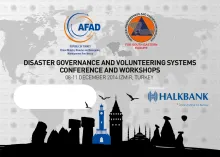
 “Disaster Governance and Volunteering Systems - Conference& Workshops” was Turkish contribution to the Disaster Management Training Programme (DMTP) for 2014 and was hosted by the Republic of Turkey Prime Ministry Disaster and Emergency Management Presidency (AFAD)
“Disaster Governance and Volunteering Systems - Conference& Workshops” was Turkish contribution to the Disaster Management Training Programme (DMTP) for 2014 and was hosted by the Republic of Turkey Prime Ministry Disaster and Emergency Management Presidency (AFAD)
As widely known, no matter how successful a country’s disaster preparedness may be, the building of safe settlements, mitigation of risks and prevention of probable disaster damages are fundamentally important. To reach the disaster victims as soon as possible and rescue them following the occurrence of disasters is the universal main objective. The existence of a common language and a healthy coordination enables faster and more efficient advancement for search and rescue operations. While recognising the differences in disaster governance and volunteering systems of the DPPI SEE member countries, through its two-fold programme, the event provided ample opportunity for observing the present disaster governance set-up in the DPPI SEE arena through presentations on related topics as well as through active discussions as part of thematic workshops.
The upload of Event Report for “Disaster Governance and Volunteering Systems - Conference& Workshops”, including conclusions and recommendations, is pending.
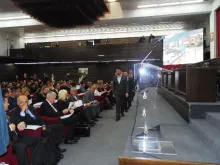
The “Conference – Establishment of the National Platform for Disaster Risk Reduction” was Montenegrin contribution to the DPPI SEE Disaster  Management Training Programme (DMTP) and was hosted by the Directorate for Emergency Management of the Ministry of Interior of Montenegro and co-organised by UNISDR Europe Region Office.
Management Training Programme (DMTP) and was hosted by the Directorate for Emergency Management of the Ministry of Interior of Montenegro and co-organised by UNISDR Europe Region Office.
The aim of the event was to establish the National Platform for disaster risk reduction in cooperation with other relevant state ministries, agencies and administrations and local authorities, and with the presence of the DPPI SEE member countries and international organisations with experience in disaster risk reduction, through information exchange on best practices and lessons learned in the filed of establishing and maintaining the work of the national platforms for disaster risk reduction.
 The conference was attended by over 170 participants from different Montenegrin ministries and other governmental institutions and agencies. In addition, 10 experts form 6 DPPI SEE member countries (Bulgaria, Croatia, Macedonia, Serbia, Slovenia and Turkey) contributed to the conference programme.
The conference was attended by over 170 participants from different Montenegrin ministries and other governmental institutions and agencies. In addition, 10 experts form 6 DPPI SEE member countries (Bulgaria, Croatia, Macedonia, Serbia, Slovenia and Turkey) contributed to the conference programme.
Detailed information on the conference can be found in the Event Report
-
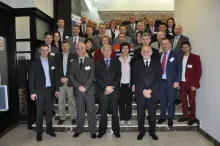
The seminar was hosted and organised by the Sector for Emergency Management of the Ministry of Interior of Serbia.
he overall aim of the seminar was to provide an opportunity for the DPPI SEE Parties to exchange experiences of their respective countries in planning of an organized local authority response to floods, flash floods and earthquakes, knowing the first impact of disasters was always at the local level. Views and opinions were also shared as regards the required level of training and equipment necessary for local-level stakeholders and responders, including that for competent services engaged in preventive and operational activities.
Twenty-two (22) experts participated in seminar, out of which thirteen (13) of them from the participating DPPI SEE Parties (Albania, Bulgaria, Bosnia and Herzegovina, Croatia, Macedonia and Montenegro), eight (8) Serbian representatives and one (1) expert from the Danish Emergency Management Agency (DEMA). Traditionally, Mr. Predrag Maric (Serbian Head of Sector) gave opening remarks on day 1. The Head of the Secretariat attended the seminar in the afternoon of day 1 and for the whole duration of day 2.
The seminar was organized as a plenary session on the day 1 and as a workshop on day 2. Target audience included managers and experts of the national and local protection and rescue services involved in the development of emergency response plans. The plenary session was dedicated to country presentations followed by related discussions where different aspects of the disaster response planning were addressed and then used as the platform for problem-analysis and drawing of relevant conclusions & recommendations. The workshop discussion on day 2 focused on brainstorming on the sub-topics that as part of the seminar agenda were communicated to the participants in advance (plan-development methodology, solutions for strengthening the capacities through involvement of different stakeholders in the planning process, funds needed for implementing the plans, control and assessment of implementation, etc.).
The seminar was evaluated by the participating DPPI SEE Parties’ as being highly informative and of relevance to the agendas of future similar events in the DPPI SEE annual programmes.
-
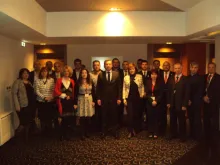
The seminar was hosted and organised by the Directorate for Emergency Management of the Ministry of Interior of Montenegro.
The seminar aimed to provide an opportunity for exchange of experiences and best practices among experts from the DPPI SEE Parties state institutions with roles and responsibilities in drafting and/or implementing laws and regulations governing the transport of dangerous goods by road in their respective countries, including in the implementation of relevant control mechanisms to prevent accidents and damage to persons, property and environment.
 Topics addressed through country presentations and follow-up discussions were: road transport of explosives, radioactive, chemical and toxic substances as well as testing of vehicles carrying dangerous goods and most importantly - national legislations regulating issuance of permits for transportation of dangerous goods – classes 1, 6 and 7. While discussing the current status of development and challenges faced in the application of related respective laws and by-laws, the participants also observed to what extent these laws had already had incorporated relevant EU directives and what was the estimation of their impact on national regulations. Necessity to establish effective information-management and data-flow between competent institutions at the national and regional level respectively was also emphasised as a pivotal point in the overall discussion.
Topics addressed through country presentations and follow-up discussions were: road transport of explosives, radioactive, chemical and toxic substances as well as testing of vehicles carrying dangerous goods and most importantly - national legislations regulating issuance of permits for transportation of dangerous goods – classes 1, 6 and 7. While discussing the current status of development and challenges faced in the application of related respective laws and by-laws, the participants also observed to what extent these laws had already had incorporated relevant EU directives and what was the estimation of their impact on national regulations. Necessity to establish effective information-management and data-flow between competent institutions at the national and regional level respectively was also emphasised as a pivotal point in the overall discussion.
In addition to eleven (11) Montenegrin experts in the field, equal number of representatives of other five (5) DPPI SEE Parties participated in the seminar (Albania, Bosnia and Herzegovina, Bulgaria, Croatia, Macedonia and Serbia). For its whole duration the seminar was also attended by Mr. Mirsad MULIC, the Montenegrin Director General. The Head of the Secretariat joined the participants at the end of day 1 and observed the seminar until end of day 2.
The seminar undoubtedly proved the importance and value of a quality expert discussion on emergency management related issues. The eligibility criteria in nominating their respective representatives was fully respected by all the participating DPPI SEE Parties.
-
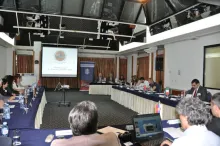
The seminar on “International Cooperation in Case of Emergencies – Host Nation Support”, hosted by the Sector for Emergency Management of the Ministry of Interior of the Republic of Serbia, represents Serbian contribution to the DPPI SEE Disaster Management Training Programme for 2015.
In recent years the region of the South Eastern Europe has witnessed a major growth in the scale and frequency of natural disasters which from the onset emphasized the importance of a rapid and effective response, including of a well-coordinated reception of requested international assistance and distribution of the humanitarian aid to the affected population.
 Under the seminar’s main topic, civil protection authorities and experts, as well as competent representatives of other stakeholders organisations engaged in the overall support to the government in the HNS, shared their national experiences in sending and receiving international assistance, including about the on-going processes to review the countries’ domestic frameworks for international response while outlining their legally binding frameworks for international disaster response operations.
Under the seminar’s main topic, civil protection authorities and experts, as well as competent representatives of other stakeholders organisations engaged in the overall support to the government in the HNS, shared their national experiences in sending and receiving international assistance, including about the on-going processes to review the countries’ domestic frameworks for international response while outlining their legally binding frameworks for international disaster response operations.
Also shared experience in provision of HNS was that of Italy through presentation of the Italian Civil Protection Department representative. At the end of the seminar, conclusions and recommendations were drafted by a host.

